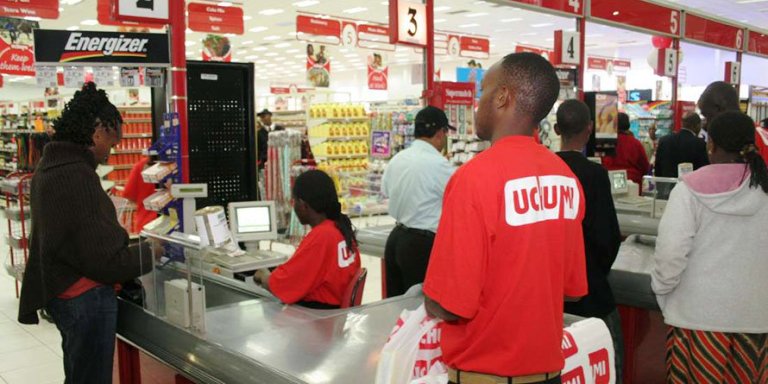Uchumi Supermarkets has used all the KSh700 million (Shs25.5bn) bailout cash it received from the government in December, prompting it to seek the assistance of financial institutions to pay staff, Kenyan media report.
The retail chain, which has not paid salaries since December, on Thursday said it used the last tranche of the KSh1.8 billion (Shs65.6bn) bailout cash to restock its stores during the Christmas holidays and to partly pay rent and a portion of staff wages.
The Cabinet in 2016 approved a KSh1.8 billion bailout package for Uchumi, KSh600 million (UShs21.8bn) more than what the retailer had asked for, to help settle its Sh3.6 billion (UShs131.3bn) debt load.
It has emerged that Uchumi is now back in a tight liquidity position that is slowing down its recovery, even as it awaits the injection of additional cash from a strategic buyer it has been courting in the past three years and about Sh2.5 billion (UShs91.2bn) from the sale of its land in Nairobi’s Kasarani area.
Salary arrears
Mohamed Mohamed, the retail chain’s acting chief executive, said Uchumi has sought the help of financial institutions to settle the salary arrears in the next two weeks as it awaits additional funds.
“We are now looking into ways of clearing the backlog of the staff salaries, and this should be sorted out in the next seven to 14 days.
“By the end of the 14 days we should at least be able to regularise the staff salaries,” Mr Mohamed said during a press briefing held after the firm’s AGM.
Uchumi also denied reports that it was facing auction over rent arrears owed to landlords but admitted that there have been threats from some creditors.
Last week auctioneers descended on Uchumi’s Kisumu branch demanding payment of Sh14 million rent arrears, a matter Uchumi says it is working to resolve.
The retailer, however, denied reports that its head office is under threat of auction by Kenya National Trading Corporation (KNTC).
Restocking plan
Uchumi said its restocking plan will continue to focus on fast-moving consumer goods until it secures funding to procure durable (hard) goods.
“What we are focusing on are key items (fast-moving consumer goods) that people need to replenish on a daily basis.
“Additional ones will come in after the sale of land, or when the new investor comes or when we have the possibility of debt financing,” said Mr Mohamed.
Uchumi also made public its plan to create an online supermarket to widen its reach and offer convenience to customers.
The retailer is said to be engaging other players in the sector to ensure a smooth rollout of the online platform before the end of the third quarter of the year.
“Recent reports show that one out of four Kenyans shop online. We are now working on improving our presence in the online space, to take advantage of it and adapt to the changing market needs. We should unveil it as soon as we are ready,” said Mr Mohamed.
“This is another strategy to cut costs because brick and mortar (physical premises) is expensive to run.”
Sh1.7bn loss
This latest announcement comes in the wake of a Sh1.7 billion (UShs62bn) loss for 2016-17, a 39 per cent drop from the Sh2.8 billion (UShs102bn) recorded in the previous year.
Mr Mohamed said that despite cost-cutting measures taken so far, last year’s political activity weighed heavily on the company’s performance.
Uchumi has over the past two years shut down several non-performing branches as increased competition from old and new rivals upended its earnings.
“Our combination of turnaround strategies continues to slowly stabilise our operations, and we are actively seeking to bring the company to a positive and sustainable position,” he said.
“Before making premature conclusions about the status of our turnaround strategy, one has to take into account that Uchumi has not been immune to broader economic pressures such as ongoing uncertainty surrounding the local supermarket sector and prolonged electioneering period.”





